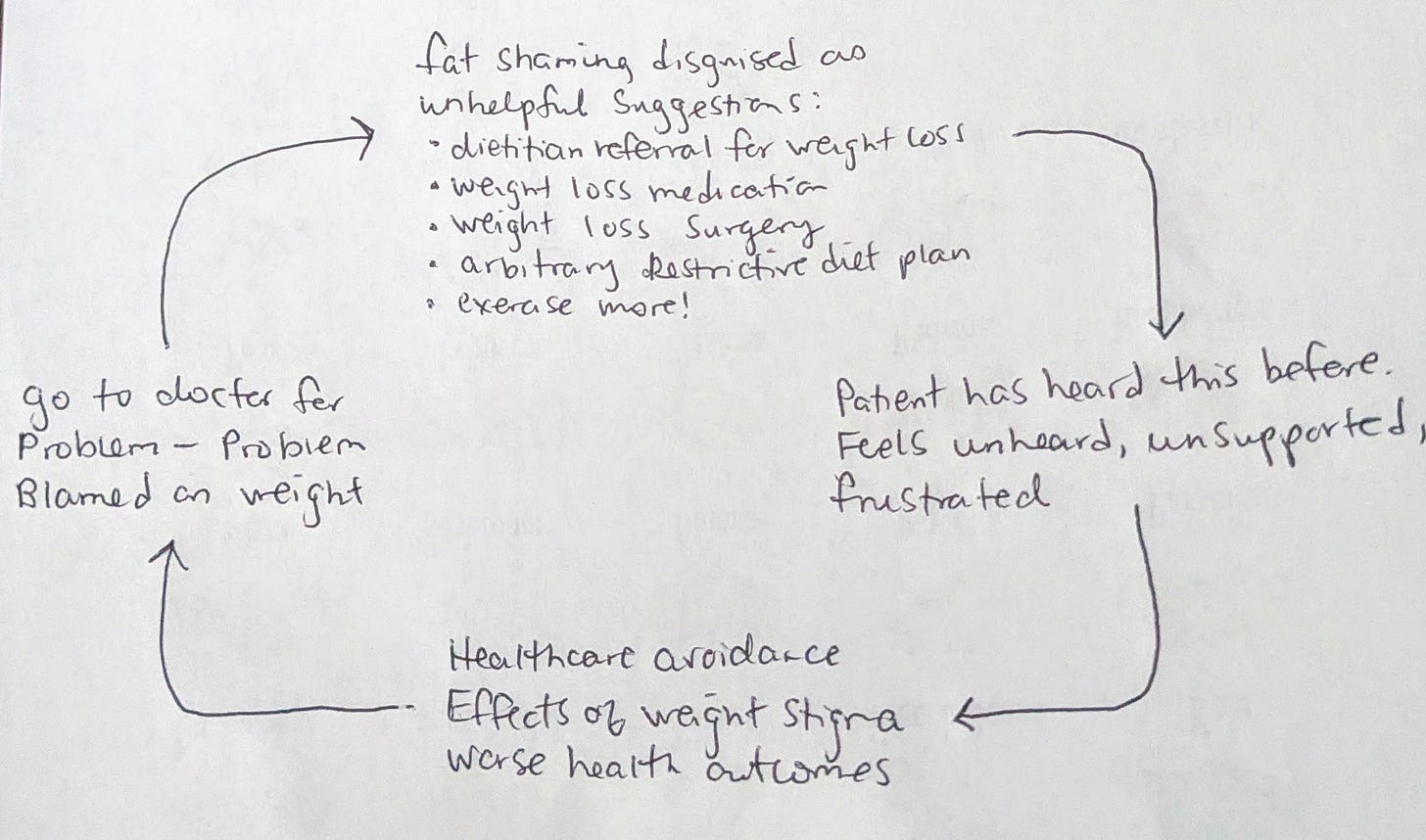i can't think of one reason not to embrace size-inclusivity in all aspects of life
Weight stigma is a literal dead end for all parties involved.
Real quick definition stuff
Size-inclusive is used interchangeably with the terms weight-inclusive and weight-neutral.
The opposite of weight-inclusive is weight-normative or weight-centric. Weight-normative approaches assume health is achievable at a specific “normal” weight and focus on weight loss and weight management as a significant goal of health care. The “normal” weight range is based off the controversial BMI scale. This approach is rooted in the belief that weight and disease are directly, causally linked and that individuals are personally responsible for the amount that they weigh. Generally, a weight-normative approach fails to account for natural body diversity and also ignores the complex factors that influence health and body composition.
Weight stigma refers to the negative attitudes, beliefs, and discriminatory behaviors directed towards individuals based on their body weight or size. Does anyone deserve weight stigma? No one does. Not even Donald Trump. Stigmatize him for being a perverted, greedy, and hateful human, but not for being fat. There is a belief that weight gain/loss is something that can be prevented/achieved through straightforward measures. These people might say, “calories in, calories out!” “just work out more!” Wow, thanks for the advice! As if everyone has not tried that to no f*cking avail ! (And just fallen into traps of weight cycling, disordered eating, low self-esteem, etc.!)
Diet culture refers to a societal system of beliefs, attitudes, and practices that promote the idealization of thinness and weight loss as measures of health and beauty. It encompasses commodification of bodies, body shame and guilt, food restriction and dieting, and an overarching and non-individualized weight loss focus.
Thin privilege is the set of social and systemic advantages experienced by people who are perceived as thin, because their bodies fit society’s beauty and health ideals. It is the flip side of weight stigma. This unearned advantage is often invisible to those who possess it, but it profoundly affects many aspects of life for those who don’t.
Health promotion and disease prevention seems to be a universal goal
What do we need to improve the health outcomes of our population? Some ideas….
Public health measures that promote and incentivize movement (investing in free, safe, and inclusive spaces for people to move their bodies like sidewalks and parks).
The ability to go to the doctor regularly for tests, scans, and indicators to screen for early detection of disease or dysfunction, maximizing benefit from effective treatments and medication.
Nutrition, cooking, farm, and financial literacy education so families have the skills, time, and resources needed to prep, cook, and eat nutrient-dense meals each day to nourish the body and fuel activity.
Simply put, behaviors are the things that are generally in our control and can promote health and prevent disease.
Is weight a behavior? No, it’s a metric representing the gravitational pull of our body and organs and bones by our Mother Earth. Behaviors are going for a walk, going to play basketball with some friends, going to the doctor for a check up, going to physical therapy, adding minced veggies to your meatloaf recipe to increase nutrient-density, etc. *Cue the Disney channel PSA*
The beauty of health behaviors are that they are 1) size-neutral and 2) they can and should be, modified because our bodies are all different. Most people can’t do a pull up. No worries, you can hold 3 lb. weights and lift the arms above the head and still exercise your shoulders and back muscles. Not everyone can (or wants to) run a 5k. No worries, you can walk a 5k on the treadmill while watching Love is Blind and still reap the benefits on the cardiovascular system. Not everyone can stand up. No worries, pop a chair fitness class on Youtube and engage muscles and mobility in this approach.
Weight-normative healthcare embraces diet culture. Diet culture feeds weight stigma. Weight stigma worsens health.
Weight stigma is pervasive. It’s on social media, at school, in the workplace. The double standard of all, though, is it’s strong presence in healthcare. Healthcare professionals often hold negative attitudes and biases toward patients with higher body weights. Patients report disrespectful treatment, negative comments, invalidation of symptoms, and a lack of compassion from providers. Healthcare is meant to promote wellness, but weight stigma becomes a barrier to healthy behavior change for so many. You realize how much this doesn’t add up when you consider the effects of said stigma: increased risk of chronic disease, eating disorders, body dysmorphia, stress, poor self-esteem, depression, anxiety, social isolation.
Why does this happen? I can’t tell if it’s because of all the weight-based fear mongering that providers as people have internalized from the media for their entire lives (think: the biggest loser, my 600 pound life, heavy weights, Dr. Oz, just to name a few), or if it’s a mere lack of time/resources preventing them from being able to go deep here into the nuance. Maybe both. Providers might have 20 minutes with their returning patients. They want to solve problems, and if both the patient and the provider think the problem is weight or weight-related, the vicious cycle continues:
It is in everyone’s best interest to embrace weight inclusivity and end weight stigma
I have heard countless healthcare professionals lament that their patients “are just not motivated.” I understand their frustration. In their weight-normative mind, they want weight loss for their patient (the patient probably wants it to) but they keep falling short, year after year. But they mistake a systemically fat-phobic healthcare system that provides no effective options as a personal lack of motivation. This cannot be where the compassion ends.
What does the provider want? Their patient to lose weight.
What does the patient want? I assure you, they also probably want to lose weight because you, their doctor, and all of society won’t shut the f*ck up about weight.
Okay so…aren’t you guys on the same page? Not yet.
Why does the provider want the patient to lose weight? I think 3 reasons. 1) Likely an implicit bias, or their own personal bias, against weight gain. 2) A deep rooted belief that weight gain = poor health. 3) They think that losing weight will solve many of the patient’s problems.
I bet the patient thinks that too. Let’s go deeper.
What does losing weight represent? In the eyes of so many, it represents health. Okay, so underneath it all, maybe the patient actually just wants to feel healthy. What does that feel like? Strong, energized, flexible, mobile, quick, balanced, well. This feels really positive. Can we focus on these amazing descriptive words as goals? We have no choice but to accept ourselves and our patients where they are. So here you are, and now let’s focus on mobility goals, energy goals, strength goals. (Behaviors!)
What else might losing weight represent to this patient? It would maybe represent inclusion in a thin-obsessed society, the ability to shop for clothes easier (many clothing brands exclude sizes about 14), an end to feeling like their body is so flawed and wrong. What they actually might want here is an end to shame, judgement…an end to people and their own doctors making assumptions based on their appearance…an end to weight-based stigma and discrimination. To feel like they are worthy of acceptance, love, respect, and appreciation in their body right now in this moment. Because they are worthy of it. WE ARE ALL worthy of acceptance, love, respect, and appreciation no matter how our bodies change or what they look like.
Is weight-inclusivity…dare I say…motivating?
The psychology of inclusion
Some people say “you’re glorifying ob*s*ty!” Nope, it’s just normalizing body diversity: we could all eat the exact same amount and type of food and exercise the same and will still all look different. And, it’s baseline human decency. Weight stigma is cruel. Inclusion can remove that cruelty from medical spheres, gyms, workplaces, and schools so that the fear of being discriminated against doesn’t hinder anyone’s ability to work towards their health goals.
Who benefits from weight-normativity? Who benefits from us hating our bodies?
The billion dollar diet industry. The bariatric surgery centers. The pharmaceutical companies. How are they going to sell their “slimming” “fat-melting” “detoxing” products and profit off of your body dissatisfaction?
Moral of the story
Many of us have goals for our health and sometimes changes do need to be made to increase mobility, functionality, strength, and reduce symptoms.
We also live in a culture where deep essential needs, such as safety and belonging, can feel conditional on our appearance, weight, and body size. This has created an unjust culture of weight-stigma and weight-based discrimination.
The truth is that the relationship between weight and health is not causal. A smaller body does not mean a healthier body. Gaining weight does not mean you have done something “wrong”. Bodies of all shapes and sizes can be healthy.
Weight-neutral and weight-inclusive approaches to wellness prove that we can actually can feel the way we want to feel (more mobile, flexible, strong) without focusing on our weight at all. Diet culture doesn’t get to decide how we feel about our bodies.
Positive changes naturally grow from self-compassion, kindness, and feeling included. Must we be shamed into behaviors out of pressure to conform our bodies to a culturally-created beauty standard? Or might we take on some changes out of respect and care for our mind and body and spirit?



